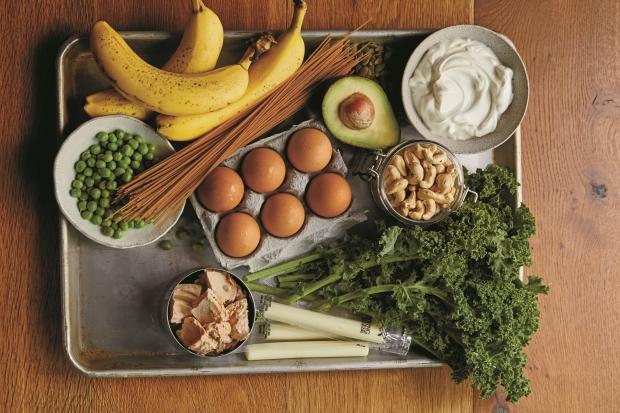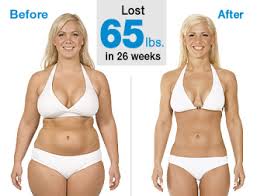Confessions of a Borderline Binge Eater
My Wake-Up Call
Last week I went out for Mexican food. One basket of chips, a cup of salsa, three margaritas, a bowl of guacamole, a steak burrito covered in sour cream, and a side order of rice and beans later, I wanted to vomit. I held my protruding stomach and looked up in pain at my boyfriend, who patted my belly and laughed. "You did it again," he said.
I didn't laugh. I felt fat, out of control.
My parents always said I had the appetite of a truck driver. And I do — I can eat and eat...then realize I'm about to get violently ill. I remember vacationing at a beach house with my family when I was 6 years old. After dinner, I sneaked to the fridge and ate an entire jar of dill pickles. At 2 a.m. my mom was cleaning vomit off my bunk bed. It's as if I lacked the brain mechanism to tell me I was full.
If you look at me — five foot eight and 145 pounds — you wouldn't guess I was a binge eater. Maybe I'm blessed with a good metabolism, or I stay active enough with running and biking that the extra calories don't affect me too much. Either way, I know that what I do isn't normal — and it definitely isn't healthy. And if statistics bear out, it will eventually make me overweight.
Shortly after the episode in the Mexican restaurant, I decided it was past time to address my bingeing. First stop: health journals. According to a Harvard Medical School study, 3.5 percent of American women have binge-eating disorder (BED). The name sounds an awful lot like what I do, but by the clinical definition — "eating larger amounts of food than normal during a two-hour period at least twice a week for six months" — I don't qualify. (Mine is more of a 30-minute, four times a month habit.) Then why do I still feel like I have a problem?
Seeking clarification, I called Martin Binks, PhD, the director of behavioral health and research at the Duke Diet and Fitness Center in Durham, North Carolina. "Just because you don't meet the diagnostic criteria doesn't mean you don't suffer," Binks assured me. "There's an eating continuum — varying levels of eating 'discontrol.' Regular mini binges, for example [hundreds instead of thousands of extra calories a day] eventually add up, and the psychological and health damage may be even greater."
I think back to nights when I've been full from dinner but still managed to wolf down seven or eight Oreos. Or lunches when I've eaten my sandwich in record time — then moved on to the chips on my friend's plate. I cringe. Living on the verge of an eating disorder is a tricky place to find yourself. On the one hand, I'm pretty open about it with friends. When I order another hot dog after devouring my first two, it becomes a joke: "Where are you putting that one, your big toe?" We have a good laugh, and then they dot their lips with napkins while I continue chowing down. On the other hand, there are lonely moments when I'm terrified that if I can't control something as basic as eating, how am I supposed to control other aspects of adulthood, like paying down a mortgage and raising children? (Neither of which I've yet to attempt.)
Hunger vs. Head Games
My eating issues defy traditional psychoanalysis: I had no traumatic food experiences early on in which hateful parents withheld dessert as punishment. I never dealt with anger by consuming an extra-large stuffed-crust pizza. I was a happy kid; most of the time, I'm a happy adult. I ask Binks what he thinks causes bingeing behaviors. "Hunger," he says.
Oh.
"Among other reasons, people who restrict their diets set themselves up for bingeing," Binks says. "Shoot for three meals, high-fiber foods, and snacks every three to four hours. Planning what you'll eat in advance makes you less likely to give in to a sudden craving."
Fair enough. But what about those times when I've eaten steadily all day and I still feel the need to have third helpings at dinner? Surely it's not hunger driving those binges. I dial the number for therapist Judith Matz, director of the Chicago Center for Overcoming Overeating and coauthor of The Diet Survivor's Handbook, for her thoughts. Our conversation goes like this.
Me: "Here's my problem: I binge, but not enough to be diagnosed with BED."
Matz: "Does overeating make you feel guilty?"
Me: "Yes."
Matz: "Why do you think that is?"
Me: "Because I shouldn't do it."
Matz: "Why do you think that is?"
Me: "Because I'll get fat."
Matz: "So the issue is really your fear of getting fat."
Me: "Um...(to self: Is it?...) I guess so. But why would I binge eat if I didn't want to get fat? That doesn't sound very smart."
Matz goes on to tell me that we live in a culture of fat phobia, where women deny themselves "bad" foods, which backfires when we can no longer stand the deprivation. It echoes what Binks was saying: If your body feels hungry, you'll eat more than you should. And then..."Food is how we were comforted as children," Matz says. (Ha! I knew the childhood stuff was coming.) "So it makes sense that we find it comforting as adults. Give me an example of when you've eaten out of emotions and not hunger." I think for a minute, then tell her that when my boyfriend and I were in a long-distance relationship, I would occasionally binge after we'd had a weekend together, and sometimes I wondered if it was because I missed him.
"Perhaps loneliness was an emotion you weren't comfortable with, so you looked for a way to distract yourself," she says. "You turned to food, but as you were bingeing you were probably telling yourself how fat it was going to make you and how you'd better work out all week and eat only 'good' foods..." (How does she know that?!) "...but guess what? In doing that, you took the focus off your loneliness."
Wow. Bingeing so I can stress about being fat instead of stressing about being lonely. That's messed up — but quite possible. I'm exhausted from all this analysis (now I know why people lie on those couches), yet I'm curious about what Matz thinks is the best way to break the cycle. "Next time you reach for food, ask yourself, 'Am I hungry?'" she says. "If the answer is no, it's still okay to eat, but know you're doing it for comfort and stop the internal scolding. Once you give yourself permission to eat, you won't have anything to divert your attention from the feeling you're trying to escape." Eventually, she says, bingeing will lose its appeal. Maybe.
Falling Off the Wagon
Armed with these new insights, I wake up on Monday morning determined to have a binge-free week. The first few days are fine. I follow Binks' recommendations and find that eating small portions four or five times a day does keep me from feeling deprived and that I have fewer cravings. It's not even hard to turn down my boyfriend's suggestion of going out for wings and beer on Wednesday night; I've already planned to cook us a healthy meal of salmon, zucchini casserole, and baked potatoes.
Then the weekend arrives. I'll be driving four hours to visit my sister and help her paint her new house. Leaving at 10 a.m. means I'll be stopping en route for lunch. As I speed along the interstate, I begin planning the healthy meal I'll have at Subway. Lettuce, tomatoes, and low-fat cheese — a six-inch, not the foot-long. By 12:30, my stomach is growling; I pull off at the next exit. No Subway in sight, so I turn in to Wendy's. I'll just get the kids' meal, I think.
"A Baconator, large fries, and a Vanilla Frosty," I say into the speaker box. Apparently, along with my toothbrush, I've left my willpower at home.
I inhale the entire meal, rub my Buddha belly and try to ignore the guilt that engulfs me for the rest of the drive. To compound matters, my sister orders pizza for dinner that night. I've already ruined my diet for the day, I tell myself, gearing up for a gorge-fest. In record time, I inhale five slices.
An hour later, I can no longer stand myself. I am a failure. A failure at eating like a normal person, and a failure at reforming my bad habits. After dinner, I lie on the couch and begin moaning. My sister shakes her head at me and tries to distract me from my self-induced pain. "What are you working on these days?" she asks. I start laughing in between groans. "An article on binge eating."
I remember Binks telling me that the way I feel after bingeing is important — and that I should try to relieve any guilt with physical activity. A brisk stroll around the block doesn't exactly ease the bloating, but I have to admit, by the time I get back to the house the guilt has lightened a bit.
Is Bingeing in My Genes?
Back at my apartment, I come across a recent study that says overeating may be genetic: Researchers at the University of Buffalo found that people with genetically fewer receptors for the feel-good chemical dopamine find food more rewarding than do people without that genotype. Two of my aunts had weight issues — they both underwent gastric bypass surgery. I wonder if I'm feeling the effects of my family tree. I'd prefer, however, to believe that binge eating is ultimately my own decision — albeit a very bad one — and therefore within my grasp to control.
I don't like feeling guilty or fat. I don't like moving my boyfriend's hand off my stomach after a big meal because I'm embarrassed for him to touch it. As with most problems, bingeing can't be fixed overnight. "I tell my patients that this is more about persistence in their effort than quitting cold turkey," Binks says. "It takes time to analyze your eating pattern and figure out how to overcome it."
A week later, during dinner with my boyfriend, I get up from the table for an extra helping of potatoes from the stove. Channeling Matz, I stop and ask myself if I'm hungry. The answer is no, so I sit back down and finish telling him about my day, proud of not eating simply to eat. One small step, but at least it's in the right direction.
It's now been a month since my self-imposed intervention, and though it's a daily struggle, I am slowly gaining control over my eating. I no longer look at foods as good or bad — the way Matz says we're conditioned to do — which helps me feel less guilty if I order french fries instead of a salad. This has actually curbed my cravings, because I know I can indulge if I choose. Mexican food is still my kryptonite, but I'm becoming convinced it's simply a bad habit: I've been overeating at Mexican restaurants for so long, my hands are practically programmed to shovel food into my mouth upon arrival. So I've set to work making some modifications: half-portion servings, one less margarita and, oh yes, my guy's hand romantically resting on my hip before any bingeing occurs, to remind me I'd rather feel sexy than bloated.
Nip Your Next Binge in the Bud
Curtailing an out-of-control appetite is the first step toward getting a handle on your weight. It starts with these easy steps.
At Home
Eat your meals and snacks while seated at a table; serve food from the stove and keep extras in the kitchen. That way, helping yourself to seconds requires getting up and walking to the other room.
At a Restaurant
Practice leaving some food on your plate when you become comfortably full. Don't use money as an excuse — you're paying for an enjoyable dining experience, not to wind up feeling ill. (Doggie-bag it if you must, but beware the midnight refrigerator raid.)
At a Party
"Try creating a physical barrier between yourself and whatever item you're tempted by," suggests Binks. "If chips are your weakness, fill up on soup or vegetables before sampling the guacamole platter."
-
Exercise tips for Kids
Exercise tips for Kids Most parents are hoping for exercise tips
-
Can You Stop Dieting and Still Lose Weight?
“Diet” may be the dirtiest word in the entire Englis
-
Tips That Can Help You Fight Hair Loss
There are as many treatments for hair loss as there are causes. W
-
Intelligent Advice For Safe And Effective Weight Loss
The process of keeping weight off after you lose it is a sign of a su
-
3 Bad Diet Mistakes To Avoid At All Cost
Even though there is so much information available about loss,
-
Make Over My Diet
Make Small Changes to Eat Healthier You know what to do: Fill up on fr
- DON'T MISS
- Your Weight Problem Could Be Genetic
- The Risks of Gastric Bypass Surgery
- The Weight Loss Advice You Have Been Waiting For
- Weight Loss Tips You Must Know
- Should You Really Start That New Eating Plan? Take This Quiz To Find Out
- The Best Workout for Your Body Type
- 5 Healthy Habits That Can Make You Gain Weightvar zeus = zeus
- Caralluma Fimbriata - Natural Appetite Suppressant
- Weight Loss Exercises: How To Achieve Success
- Super Advice About How To Be Successful With Weight Loss




